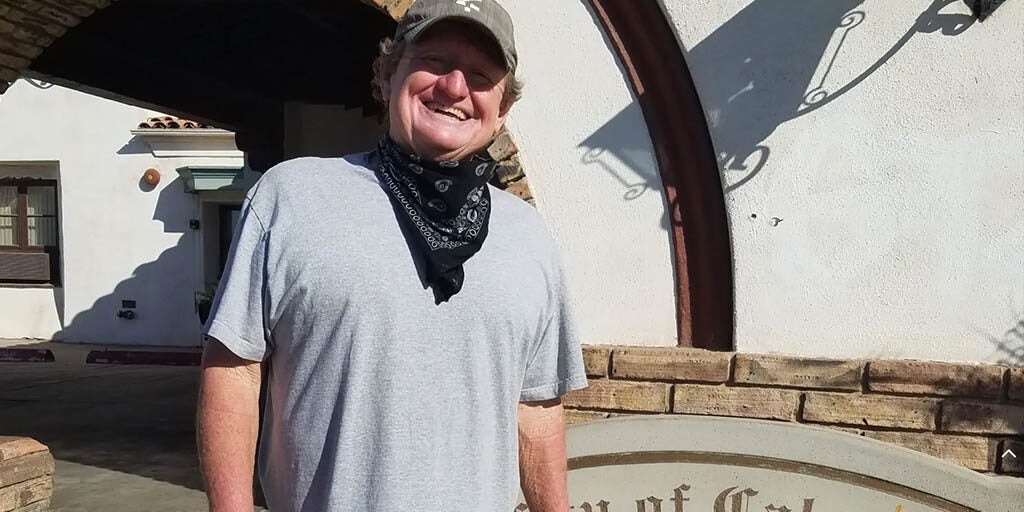
A home is gold: Robert’s story

Injured and denied disability benefits, this former goldmine worker spent five years homeless in Calexico. The only homeless shelter in the area that helped him get back on his feet.
“There’s a lot of gold back in those hills,” says Robert, a native of Westmorland, California, in the Imperial Valley.
In 1990, a few years after one of the largest goldmines in the U.S. opened roughly 40 miles east of his hometown, Robert took a job as a haul truck operator at the site near Glamis, California. “The truck’s seat was 36 feet high; it hauled 200 tons at a time,” he recalled. “The tires alone were 12 feet high.”
Robert worked at the goldmine for a total of 15 years, his two tenures divided by a period of time in which the mine had closed. Despite being a hard worker born and bred for the region’s grueling farm labor, he would eventually see his steady employment—and everything tied to it—crumble around him.
Out of Commission
Robert lost his job in 2014, when a nagging, untreated ankle injury he had suffered in a car crash became severe, debilitating arthritis.
“Things started slipping away,” Robert said. “I couldn’t pay my rent, and I couldn’t access medical care to be able to recover and get a new job.”
Robert loved his work. He’s built for it, physically and mentally. A bad ankle took that away from him—and much more. Divorced, and with his parents living in Oklahoma and his grown sons in San Diego, Robert became homeless.
Streets & Shelter
Being homeless on the streets of Calexico is different—and, in many ways, perhaps more dangerous—than in other places. The walled-off town in the backyard of bustling Mexicali is not for the faint of heart. Though a unique cultural setting and tight-knit community, Calexico continuously grapples with crime, drug trafficking and unemployment. When most cities empty out at night, Calexico buzzes with thousands of migrants from across the border lined up at buses to be selected as the day’s farm workers. The migrants are essentially homeless.
“This is a border town; it’s a tough go,” Robert said. “You have to keep one eye open when you lay down at night. A lot of bad stuff can happen here.”
Robert described a buddy system of homeless men finding a means to sleep safely on the streets. “Two or three of us would sleep in the same spot, while one stayed awake to watch over,” he said. “There’s always someone walking by. You didn’t get a whole lot of sleep, but you had to make the best of the situation. Mind your own business and it will work out; you have to make it work out.”
Running low on money and energy, Robert found Our Lady of Guadalupe (OLG), a homeless men’s services facility operated by Catholic Charities Diocese of San Diego. It’s the only homeless men’s shelter in Imperial County. Beyond the essentials of shelter, showers and meals, the staff at OLG gave Robert the resources and guidance to pursue an end goal. Over a span of several years, Robert toggled between the streets and the shelter, the latter serving as a place to make progress.
True to the Desert
Robert’s parents both died in Oklahoma while he was homeless in Calexico. When they were alive, they maintained no ties to the Imperial Valley other than Robert. “They didn’t care for it here,” he said. “People might say it’s an ugly place, but for me, this is home. It’s where I was raised and where my roots are. I’ll never live anywhere else.”
Robert gushes with love for Calexico—the food, friends, quick trips across the border; this of a town that has been the backdrop of his despair. He loves the cooler nights in winter and doesn’t sweat the stifling heat of summer.
Learning about Robert’s situation and recognizing his perpetually positive attitude, Catholic Charities saw in Robert a man who wanted to be at home in the Valley—not on the streets, not in a shelter, but truly home.
Many Steps to Success
Through the staff and services at OLG, Robert embarked on a path to reclaim his life. First, he obtained medical insurance. Then, Supplemental Nutrition Assistance Program (SNAP) benefits. From there, he needed to consult with a specialist to diagnose his ankle injury and subsequently apply for disability benefits.
Like many people, Robert faced a long and winding road to access federal Social Security Disability Insurance (SSDI). Only about half of applicants are approved for SSDI, and fewer still (about a third) are approved for Supplemental Security Income (SSI). It took over five years of advocacy and persistence for Robert to finally receive permanent SSDI benefits. All the while, he was homeless, in pain, on the streets, with no assistance.
Factoring in the funds required upfront, Robert’s disability benefits did not provide enough money for him to afford housing. Catholic Charities helped Robert find affordable, permanent housing, and assisted with the deposit and first two months of rent. Robert is now in his new home, a $400 per month low-income apartment in Calexico, awaiting scheduled ankle fusion surgery that he had to postpone due to the pandemic.
“I would still be on the street if it wasn’t for the people at OLG,” Robert said. “They helped me a lot. Not only that, I enjoyed my time there. I made a lot of good friends.”
Asked how he kept the strength to survive on the streets for so long and the perseverance to find a way out, Robert recited a saying from his father: “You just have to grab it and growl.”
[The article was written by Appaswamy “Vino” Pajanor, chief executive officer of Catholic Charities San Diego, and used with his permission.]








